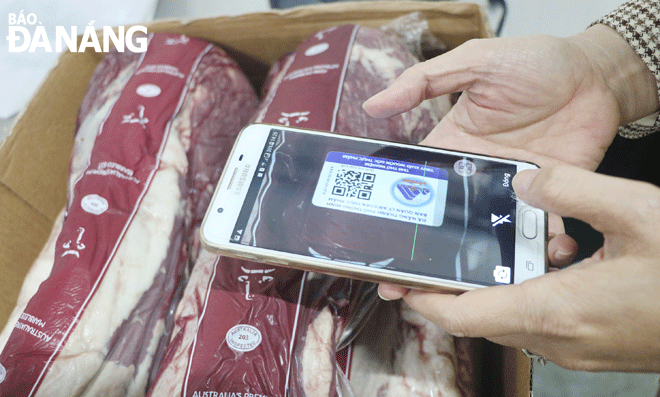Da Nang intensifies management of food origin and quality by QR-Codes
The Da Nang Food Safety Management Board on Thursday held a meeting to review Phase 1 of the ‘Food traceability’ project as part of the ongoing large-scale Smart City Building Project in Da Nang in a bid to turn the city into a venue of safe food.
 |
| Shoppers scan the QR codes to trace down the origin of the products on sale at the Da Nang branch of the Ngon Classic Co., Ltd., in Tho Quang Ward, Son Tra District. Photo: VAN HOANG |
Kicking off on April 2021, the ‘Food traceability’ project plays an important basis for ensuring transparent information on production processes to build up strong customer trust in tandem with increasing the value of products.
The project started with the construction of food traceability software designed with 264 functions, used on the web platform and mobile app for 16 actors participating in the system.
The first phase of the ‘Food traceability’ project was implemented at a total cost of nearly VND4,923 billion funded by the municipal budget.
Under the project, focus was placed on building a database and web/app with in-depth traceability for the meat and egg product chain, enhancing food safety management capacity and investing in equipment in service for traceability.
After a period of experimental and practical implementation, so far, the traceability of pork and beef chains has been carried out for many businesses/facilities that produce and supply food.
For pork and beef products raised in the city, information retrieval is done from farms to consumers. In case the meat is sourced from other provinces and cities nationwide, it can be traced starting from the slaughterhouse. Meanwhile, meat imported from abroad is traceable from importers based in Viet Nam to units and businesses in Da Nang and to consumers.
Also, QR codes attached to products on sale at a total of about 1,500 food production and business establishments, and restaurants across the city.
Consumers install a QR-code scanner application on their smart phones to scan the labels and find out the origin of the food which they have bought.
In fact, food traceability makes consumers feel more secure about using products with clear origin and guaranteed quality, in tandem with preventing commercial frauds and giving a lift to the brand value of Vietnamese products.
Under this highly practical project, Local management agencies are entitled to receive feedback from consumer on any kinds of products, and conduct surprise inspections and make updates on monitoring missions.
Meanwhile, food production, processing and trading establishments are supported to build up a data warehouse, proactively declare basic information and make updates on input and output products.
Consumers are highly advised to join processes of evaluating food quality and even report incidents of food safety risk through smart-phone apps, thus contributing to the growth of safe and quality food products as well as ‘boycotting’ and removing poor-quality food and those with unknown origin from the local food consumer market.
The ‘Food traceability’ project deployment is a positive step to build Da Nang into a venue of safe food imbued with the people-centered spirit and ensuring transparent information in food-related matters.
The next phases of the smart food traceability project on other food chains will be conducted in the time to come.
Reporting by PHAN CHUNG – Translated by A.THU








